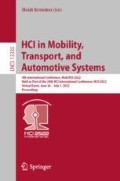Abstract
In the next half decade, there will be nearly 40 million potential Gen Z (or Gen Z for short) consumers in the Chinese market who will have a high propensity to buy cars. This study focuses specifically on Chinese Gen Z. It seeks to find out their car-buying preferences, lifestyles, how they understand and use their vehicles, and their daily driving needs, in the context of China. Our goal is to develop potential concepts and collect valuable insights from user research to guide our future product design. As a first step, we identified characteristics of Gen Z in China based on previous studies and industry research reports: Gen Z tends to focus on their feelings and needs, was born and lives on the Internet, and knows they have easy access to all the information they need, enjoys independence but also desires connectedness, uses the technology they are so good at, and loves Chinese culture. Next, we applied a qualitative method combining in-depth interviews and field observation. Twenty participants in China’s first- tier cities, such as Beijing, Shanghai, and Shenzhen; second-tier cities, such as Changsha, Hunan, and Chengdu, Sichuan; and third-tier cities, such as Hengyang, Hunan, and Mianyang, Sichuan, had participated. The current study revealed that (a) Gen Z is good at gathering the information they need from KOLs on the Internet to select a suitable car for themselves; (b) a car is assigned multiple roles by Gen Z, such as a friend, a private space, and an assistant; (c) although there is no significant difference between Gen Z and their Millennial counterparts when it comes to car use scenarios, for instance, going to work, shopping, or organizing a road trip, they are more likely to have a connection with friends during a trip, so the connection between their car and the passenger or another car became more important. In addition to the detailed user needs to be highlighted in the scenarios, we also discussed the design possibilities to shape the future smart car based on Gen Z’s needs for driver-automation shared control, digital cockpits, and their preferences for the car’s interior and exterior decoration.
Access this chapter
Tax calculation will be finalised at checkout
Purchases are for personal use only
References
Cyanhill Capital: Definition and Characteristics of China’s Gen Z: Consumer Report of the Year 2021. https://36kr.com/p/1310331587281670. Accessed 10 Feb 2022
Coupland, D.: Generation X: Tales for an Accelerated Culture. Abacus (1991)
China Internet Network Information Center: The 7th, 9th, 11th, 13th, 15th, 17th, 19th, 21st, and 23rd Statistical Survey Report on Internet Development in China. https://www.cnnic.net.cn/hlwfzyj/hlwxzbg/index.htm. Accessed 10 Feb 2022
PwC, SuperELLE: The Nation of Youth 2021: Cultural Insight and Business Impact Report. https://www.pwccn.com/en/services/deals-m-and-a/publications/young-power-china-white-paper-nov2021.html. Accessed 10 Feb 2022
Li, C.: Social changes and the Chinese youth issues. Youth Explor. 5–21 (2018)
Next100, Gen Forward: Millennials and Gen Z Want Affordable Child Care. https://thenext100.org/millennials-and-gen-z-want-affordable-child-care/. Accessed 10 Feb 2022
Orient Securities: The New Needs, New Culture, and New Economy: In-depth Economic Report on Gen Z. http://www.199it.com/archives/900600.html. Accessed 10 Feb 2022
Djafarova, E., Bowes, T.: ‘Instagram made Me buy it’: Generation Z impulse purchases in fashion industry. J. Retail. Consum. Serv. 59 (2021)
iResearch: Insight of Gen Z’s Beauty and Skincare Consumption Report. https://report.iresearch.cn/report/202103/3748.shtml. Accessed 10 Feb 2022
Endata Inc: Understanding of the Gen Z’s Entertainment Content Consumption Market. http://www.199it.com/archives/1324647.html. Accessed 10 Feb 2022
TANGUX, and BNU User Experience Center: China Health and Wellness White Paper (Youth Edition). https://zhuanlan.zhihu.com/p/446676590. Accessed 10 Feb 2022
Yiche Research Institute: How to handle Gen Z. https://news.yiche.com/hao/wenzhang/39937540/. Accessed 10 Feb 2022
Ipsos, and Bilibili: Gen Z Automotive Insights Report of the Year 2021. http://www.199it.com/archives/1316962.html. Accessed 10 Feb 2022
Author information
Authors and Affiliations
Corresponding author
Editor information
Editors and Affiliations
Rights and permissions
Copyright information
© 2022 The Author(s), under exclusive license to Springer Nature Switzerland AG
About this paper
Cite this paper
Huang, Q., Mao, G., Liu, Y., Wang, Y., Luo, X., Wang, J. (2022). A Deep Dive into the China’s Gen Z: How They Use and What They Expect for Their Cars. In: Krömker, H. (eds) HCI in Mobility, Transport, and Automotive Systems. HCII 2022. Lecture Notes in Computer Science, vol 13335. Springer, Cham. https://doi.org/10.1007/978-3-031-04987-3_11
Download citation
DOI: https://doi.org/10.1007/978-3-031-04987-3_11
Published:
Publisher Name: Springer, Cham
Print ISBN: 978-3-031-04986-6
Online ISBN: 978-3-031-04987-3
eBook Packages: Computer ScienceComputer Science (R0)

